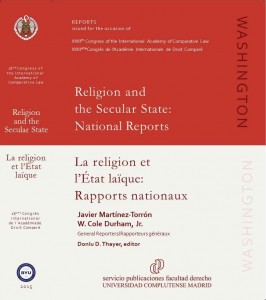A very interesting book on cultural and religious conflicts published by Javier Martínez-Torrón & W. Cole Durham, Jr. (2015)
Strongly recommended: the latest book published by Javier Martínez-Torrón & W. Cole Durham, Jr. (eds.), Religion and the Secular State: National Reports, Servicio de Publicaciones de la Facultad de Derecho de la Universidad Complutense (Madrid, Spain), 2015, 898 pages.
In European societies of the XXIst Century, marked by a growing secularism, conflict of cultures grows at a breakneck speed. It can be said that cultural conflicts in general and religious conflicts in particular constitute an enabling environment for the development of the terrible «Hate Speech». On Hate Speech the study by CH. Mensching is of the essence: CH. MENSCHING, Hassrede im Internet, Duncker & Humblot (Verlag), Berlin, 2014 (ISBN 978-3-428-13326-0) (http://www.lehmanns.ch/shop/recht-steuern/30935794-9783428133260-hassrede-im-internet).
The techniques proper to private international Law, usually orientated to values, can provide valid and balanced solutions for these cultural-religious conflicts.
From the site of the editor Recent years have seen religion assume an increasingly visible place in public life, with mixed results that have been aptly described in terms of the “ambivalence of the sacred”. Every state adopts some posture toward the religious life existing among its citizens. That posture is typically contested, leading to constant adjustments at the level of constitutional and statutory law, as well as constantly evolving judicial and administrative decisions. While some states continue to maintain a particular religious (i.e., non-‐secular) orientation, most have adopted some type of secular system. Among secular states, there are a range of possible positions with respect to secularity, ranging from regimes with a very high commitment to secularism to more accommodationist regimes to regimes that remain committed to neutrality of the state but allow high levels of cooperation with religions. The attitude toward secularity has significant implications for implementation of international and constitutional norms protecting freedom of religion or belief, and more generally for the co-‐existence of different communities of religion and belief within society. Not surprisingly, comparative examination of the secularity of contemporary states yields significant insights into the nature of pluralism, the role of religion in modern society, the relationship between religion and democracy, and more generally, into fundamental questions about the relationship of religion and the state. This book contains national reports on the topic “Religion and the Secular State” from 58 reporters representing 43 countries, plus a general report written by Professors Javier Martínez-‐Torrón and W. Cole Durham, Jr. The reports, originally prepared for the 18th World Congress of the International Academy of Comparative Law, were published in Interim form in 2010. This final volume, with updated and sometimes extensively modified reports, was prepared to coincide with the 19th Congress in Vienna in July 2014. The topic “Religion and the Secular State”, if construed too broadly, could conceivably cover virtually every subject relating to law and religion. For that reason, the general reporters asked the national reporters to focus on a number of recurring tension points in the relationship of religion and the state: (1) the general social context; (2) the constitutional and legal setting; (3) religious autonomy (and autonomy of the state from religion); (4) legal regulation of religion as a social phenomenon; (5) state financial support for religion; (6) civil effects of religious acts; (7) religion and education; (8) religious symbols in public places; and (9) tensions involving freedom of expression and offenses against religion. Keeping in mind the variety of national circumstances, the aim has been to obtain a picture of the solutions provided by different countries to basically the same overarching problem: how the secular state deals with religion or belief in a way that preserves the reciprocal autonomy of state and religious structures and guarantees the human right to freedom of religion and belief. This volume has been published by the Publishing Service of Complutense University Law School, thanks to the contribution of the International Center for Law and Religion Studies of Brigham Young University
http://www.religlaw.org/content/blurb/files/Leaflet%20Washington%20book%202015%20(general).pdf):
Congrats to one of the most well-known experts in the world of the relationships between Law & Religion, Prof. Dr. D. Javier Martínez-Torrón.
Murcia 3 mayo 2015
Javier Carrascosa González
Catedrático de Derecho internacional privado
Universidad de Murcia
____________________________
FICHA:
– Javier Martínez-Torrón & W. Cole Durham, Jr. (eds.), Religion and the Secular State: National Reports,
– Editorial: Servicio de Publicaciones de la Facultad de Derecho de la Universidad Complutense (Madrid, Spain), 2015, 898 pages.
– MORE INFO: Site of the editor:
http://www.religlaw.org/content/blurb/files/Leaflet%20Washington%20book%202015%20(general).pdf
- Traditional Knowledge: Cultural Heritage or Intellectual Property Right?
- EDITORIAL COMARES: COMING UP !!!



